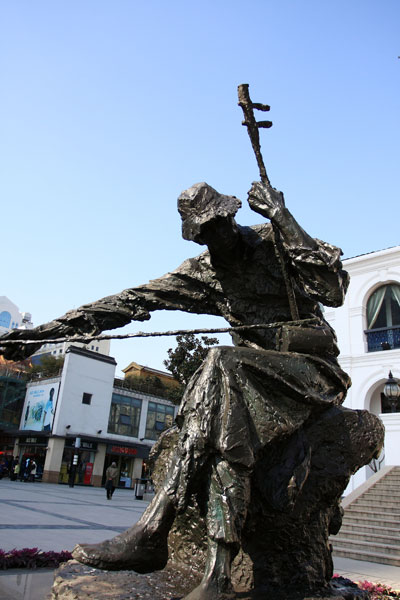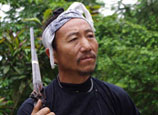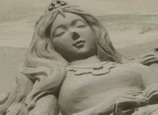
 |
| A statue of Abing at the musician's former residence in Wuxi, Jiangsu province. (China Daily) |
The most celebrated musician to come out of Wuxi is a street musician. Hua Yanjun died shortly after playing four of his hundreds of tunes to a visiting musicologist with a recording machine.
It was a rare piece of equipment in 1950 and thankfully it chronicled arguably the most elegiac tune in Chinese history.
The Moon Reflected in the Second Spring brings out the sorrow of erhu, the Chinese two-stringed fiddle that has a natural timbre of mournfulness. The melody never fails to make me teary-eyed, even before I learned of the wretched life of its composer.
Hua (1893-1950) is popularly known by his nickname, Abing.
He contracted syphilis at the age of 34 and gradually lost sight in both his eyes. He also had an opium addiction, which hastened his descent into poverty. He was kicked out of the Taoist temple where he had worked since childhood and literally had to play on the street for food.
By the time the Beijing musicologist showed up, he had stopped playing for so long he had to borrow an erhu and a pipa for the occasion. His playing, which can be heard on the recording, was far from skillful, but the tinge of sadness seeps through the cracks of bad recording quality and rusty playing techniques.
It is the sound of a lost soul in a time of turmoil.
But once I knew of his Taoist upbringing, I gained a fresh understanding of the piece.
Taoism encourages a certain aloofness from the din of the world. Artists in pursuit of their dreams often find solace in nature and its way of reflecting human emotions.
When the music expert asked him for the title of the piece, he said it didn't have one. They settled on the famous spring in Wuxi, his hometown.
It is called "the second spring in the world". I asked locals about the No 1 spring in the world, and they responded that several candidates are fighting for the title but "we're happy to settle for second place".
That humility is palpable in the music. The melody flows like water, heaving up and down and at one point almost pausing but carrying on.
I didn't detect a trace of defiance as some have suggested. It seems to trickle from Abing's heart, bleeding with tears yet not a trace of self-pity. It is sadness at its most gripping and transcendent.
There are many artists like Abing all over the country, in streets and villages. For most of them, their music is lost for good. Abing is lucky that his signature piece has been preserved for posterity. Certainly he never expected to have such exalted stature after his life — to be the proud son of Wuxi.
Had he enjoyed a life of comfort and affluence, he would not have been able to create the most heart-breaking tune known to most of his countrymen.
On a recent weekend, in a downtown plaza not far from his old residence, several elderly gentlemen were playing erhu, almost echoing one another.
They were just enjoying themselves and perhaps adding background music for busy passersby and sounds of joy to the city landscape. They do not have to play for food. They were playing for fun.
















 Controversial audition for 'rich blind date' -- being pretty is just not enough
Controversial audition for 'rich blind date' -- being pretty is just not enough


![]()
